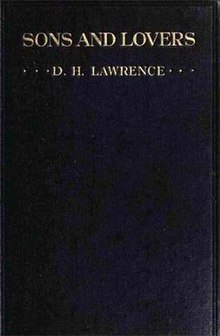Sons and Lovers
 |
|
| Author | D. H. Lawrence |
|---|---|
| Country | United Kingdom |
| Language | English |
| Genre | Autobiographical novel |
| Publisher | Gerald Duckworth and Company Ltd |
|
Publication date
|
1913 |
| Pages | 423 |
| Preceded by | The Trespasser |
| Followed by | The Rainbow |
Sons and Lovers is a 1913 novel by the English writer D. H. Lawrence, originally published by B.W. Huebsch Publishers. The Modern Library placed it ninth on their list of the 100 best novels of the 20th century. While the novel initially received a lukewarm critical reception, along with allegations of obscenity, it is today regarded as a masterpiece by many critics and is often regarded as Lawrence's finest achievement.
The third published novel of D. H. Lawrence, taken by many to be his earliest masterpiece, tells the story of Paul Morel, a young man and budding artist.
The original 1913 edition was heavily edited by Edward Garnett who removed 80 passages, roughly a tenth of the text. The novel is dedicated to Garnett. Garnett, as the literary advisor to the publishing firm Duckworth, was an important figure in leading Lawrence further into the London literary world during the years 1911 and 1912. It was not until the 1992 Cambridge University Press edition was released that the missing text was restored.
Lawrence began working on the novel in the period of his mother's illness, and often expresses this sense of his mother's wasted life through his female protagonist Gertrude Morel. Letters written around the time of its development clearly demonstrate the admiration he felt for his mother – viewing her as a 'clever, ironical, delicately moulded woman' — and her apparently unfortunate marriage to his coal-miner father, a man of 'sanguine temperament' and instability. He believed that his mother had married below her class status. Lydia Lawrence wasn't born into the middle-class. This personal family conflict experienced by Lawrence provided him with the impetus for the first half of his novel – in which both William, the older brother, and Paul Morel become increasingly contemptuous of their father – and the subsequent exploration of Paul Morel's antagonising relationships with both his lovers, which are both incessantly affected by his allegiance to his mother.
The first draft of Lawrence's novel is now lost and was never completed, which seems to be directly due to his mother's illness. He did not return to the novel for three months, at which point it was titled 'Paul Morel'. The penultimate draft of the novel coincided with a remarkable change in Lawrence's life, as his health was thrown into turmoil and he resigned his teaching job to spend time in Germany. This plan was never followed, however, as he met and married the German minor aristocrat, Frieda Weekley, who was the wife of a former professor of his at the University of Nottingham. According to Frieda's account of their first meeting, she and Lawrence talked about Oedipus and the effects of early childhood on later life within twenty minutes of meeting.
...
Wikipedia
